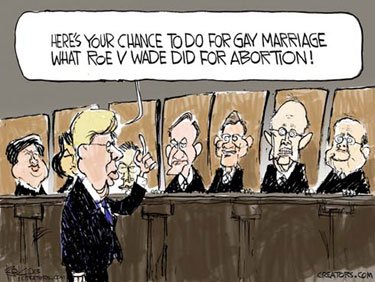Andrew C. McCarthy thinks it’s time to drop the fiction that Supreme Court justices are following the law. Last week’s decisions demonstrate once and for all that the majority of the Court is comprised of partisan politicians.
Already, an ocean of ink has been spilled analyzing, lauding, and bemoaning the Supreme Court’s work this week: a second life line tossed to SCOTUScare in just three years; the location of a heretofore unknown constitutional right to same-sex marriage almost a century-and-a-half after the adoption of the Fourteenth Amendment; and the refashioning of Congress’s Fair Housing Act to embrace legal academe’s loopy “disparate impact†theory of inducing discrimination.
Yet, for all the non-stop commentary, one detail goes nearly unmentioned — the omission that best explains this week’s Fundamental Transformation trifecta.
Did you notice that there was not an iota of speculation about how the four Progressive justices would vote?
There was never a shadow of a doubt. In the plethora of opinions generated by these three cases, there is not a single one authored by Ruth Bader Ginsburg, Stephen Breyer, Elena Kagan, or Sonia Sotomayor. There was no need. They are the Left’s voting bloc. There was a better chance that the sun would not rise this morning than that any of them would wander off the reservation.
There was not an iota of speculation about how the four Progressive justices would vote.
How can that be? Jurisprudence is complex. Supple minds, however likeminded, will often diverge, sometimes dramatically, on principles of constitutional adjudication, canons of statutory construction, murky separation-of-powers boundaries, the etymology of language, and much else. Witness, for example, the spirited debate between the Court’s two originalists, Scalia and Clarence Thomas, over a statute that, in defiance of Obama policy, treats Jerusalem as sovereign Israeli territory.
But not the Court’s lefties, not on the major cases.
And it is not so much that they move in lockstep. It is that no one expects them to do anything but move in lockstep — not their fellow justices, not the political branches, and certainly not the commentariat, right or left.
It is simply accepted that these justices are not there to judge. They are there to vote. They get to the desired outcome the same way disparate-impact voodoo always manages to get to discrimination: Start at the end and work backwards. Guiding precedents are for the quaint business of administering justice. In the social justice business, the road never before traveled will do if one less traveled is unavailable.
But there’s a problem. Once it has become a given that a critical mass of the Supreme Court is no longer expected, much less obliged, to do law, then the Court is no longer a legal institution. It is a political institution.
That is where we are. We should thus drop the pretense that the Court is a tribunal worthy of the protections our system designed for a non-political entity — life-tenure, insulation from elections, and the veil of secrecy that shrouds judicial deliberations.
If the justices are going to do politics, they should be in electoral politics. If John Roberts is going to write laws on the days when he isn’t posing as powerless to write laws, if Anthony Kennedy truly believes the country craves his eccentric notion of liberty (one that condemns government restraints on marriage 24 hours after it tightens government’s noose around one-sixth of the U.S. economy), then their seats should not be in an insulated third branch of government. They should be in an accountable third chamber of Congress.
If, for old times’ sake, we want to maintain some harmless vestige of the charade, then let them keep wearing their robes to work — for at least as long as they can persuade voters to keep them in these jobs. Let’s dispense, though, with the fiction that their judgments are the product of legal acumen rather than sheer will.
Read the whole thing.






Please Leave a Comment!